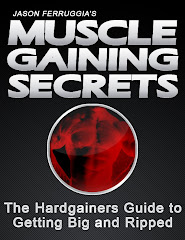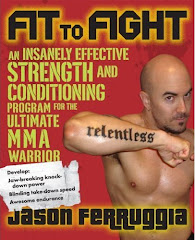Today we have a great interview with my buddy and world renowned speed expert, Patrick Beith. Check it out...
Question: Patrick, please tell us a little about your background coaching speed and who you have worked with?Answer: I graduated with my Bachelor of Science from the University of Massachusetts. Right after graduation I started working as an intern, to who I feel is the top strength & conditioning coach in the world, Mike Boyle. From there I went to get a few certifications from the NSCA (Certified Strength & Conditioning Specialist), ACSM (Health/Fitness Instructor), NASM (Performance Enhancement Specialist) and USA Track & Field Level II Sprint coach certification.
Since interning for Coach Boyle, I have always been passionate with working with the youth athletes. I mostly work with the junior high and high school level student-athletes. It’s an amazing feeling to see the changes and how your ‘kids’ develop as athletes and people.
Q: What is the state of the speed industry in your opinion?A: The speed industry is blowing up right now. It’s great to be apart of that but I have also seen many problems that happens with this sudden growth. Right now, you are seeing high schools hiring strength and speed coaches, which was almost unheard of a few years earlier. The problem is that every person who has ever run or ever thought about running before is claiming to be a speed expert. As an athlete, you just have to be careful who you take advice from.
Q: What are the top two common myths that coaches still believe in regarding speed development?A: There are so many myths regarding speed development and proper training but I will give you some that I hear all of the time from coaches.
1. Speed work is running 100 yards or 200 yards or repeat 40’s with little or no rest.
This is False. I have coaches tell me all the time that their athletes are doing speed work and then goes into telling me that his athletes are running beasts, suicides, repeat 100 meters, or repeat 40 yards dashes with their rest period is turning around and walking back to the line.
True speed work is performed at 90-100% intensity for 2-8 seconds. You also need to be fully recovered before you start your next repetition if you want to get the full benefits of speed training. I use 1 minute of rest for every 10 meters run. I think I got the rest recommendations from speed coach Charlie Francis.
2. You can’t train speed.
This saying is in the news, in the newspaper and in magazines all the time. I don’t want people to misconstrue this. You can’t train an athlete’s natural talent. Deion Sanders, Maurice Greene, Darrell Green, etc are going to be fast no matter what. Does that mean they can’t get faster? Of course they can. If they couldn’t then we would both be out of a job. Speed is a skill that is trainable and needs to be trained to improve it.
Q: In general, how many days per week should athletes train speed?A: Two to three days per week. I wouldn’t train speed more then 3 days a week, 2 days is more the average. Performing more then 3 days of speed work or even too many weeks of 3 days of speed work can cause your body to break down. I believe that you get faster recovering from the speed work you did so you must not overdo it.
Q: Conditioning for speed is often a confusing topic for many new coaches. What is your approach to improving conditioning levels for speed events?A: Most speed and power athletes hate conditioning work. This is because most of them had a coach who on a conditioning workout day would have his/her athletes go out on the roads for some distance running. If you see a 270 lb. lineman out on the road, it looks ugly. These athletes or any speed and power athletes do not ever need to be out running on the roads. This would cause unneeded pounding on their joints and they will not benefit form this type of exercise, in fact it might cause set backs!
For conditioning work, I really like to use general strength circuits. General strength (GS) circuits are usually bodyweight exercises that involve no external loading. I use them to help maintain healthy joint and soft tissue strength, provide some aerobic capacity work, is a good recovery workout, is core strengthening, helps with balance/coordination/proprioception and enhances gross motor performance. So, you get the aerobic conditioning work in and reap all of these other great benefits. More bang for your buck which we as coaches are always looking for.
Q: What might be a sample preseason routine for conditioning for the 100m or 200m event?A: In the preseason I use more volume of conditioning work then decrease it throughout the periodized season as the training emphasis changes.
Here is a basic example:
Perform on a football field. Jogging 65% on the sidelines each corner. Do one exercise in each corner. Or if you don’t have the room have your athletes jog 50 meters in between each exercise. Rest 3 minutes then repeat the circuit.
Split squats - 10 each leg
Rotational push-ups - 8 each
Bicycles - 1x30
Burpees - 1x10
Staggered push-ups - 10 each
Russian twists - 1x25
Backwards lunges - 10-each leg
Lateral lunges - 10 each leg
Reverse crunches - 1x20
1 Leg squats - 10 each leg
Q: What about conditioning for field and court sports? Is your
approach the same?A: I use the same approach with my field and court sport athletes. Some exercises change and volume changes depending on the sport. Again, GS circuits work on everything to help develop each athletes work capacity. Also, depending on the sport, I use intensive tempo or interval work to help build the necessary lactic tolerance needed for a specific sport. Always look at your energy system demands of your sport before you start putting together your workouts.
Q: In your opinion, is sport specific speed even necessary? (Basic acceleration and change of direction skills versus sport specific movement patterns)A: I think that the skills must be taught in order for an athlete to excel. We first need to teach the athletes to cut properly, apply force correctly, and show them what we are looking for when they change direction etc. If they master the drill, 9 times out of 10 they can carry it over to their sport. It’s hard to really get sport specific with an athletes training without playing their actual sport.
We can add soccer balls if they play soccer, add different audio and visual cues, add contact to certain drills, put them in different situations, etc. but there is nothing like the real thing. We should worry more about teaching the correct movement patterns and speed mechanics and let the athletes carry it over to their sport. As speed coaches, we don’t always have a say in what the sport coach is doing for in season practice, so we need to be able to prepare our athletes for everything and give them the skills needed to shine in their sport environment.
Q: What's the best age to begin formal speed development?A: Formal speed development, that’s a good question. I use a lot of speed games with my younger athletes where we are working on speed development without them really knowing it. I use the same rules (intensity, volume, rest) with my speed games so they can still reap the same benefits as ‘structured’ speed training but I make it more fun. Actually, I use speed games with all of my athletes, it really can change the whole dynamic of training that day and makes it a lot more enjoyable for all age athletes. High school is where I start to break down form and really work on mechanics.
Q: Should girls train differently than boys when it comes to speed development?A: With my female athletes I work a lot on strength development and body awareness drills. When it comes to speed development, I use time more of a marker then gender. So, I still use my 2-8 seconds for pure speed work (acceleration and maximum velocity). It’s going to take a female longer to run 30 meters then a male so you need to make adjustments in rest, reps, volume and progression. I hope that makes sense.
To learn more about Coach Beith's speed training system and for a free report - 'Secrets to Developing Dominant Speed' go to
www.CompleteSpeedTraining.com










